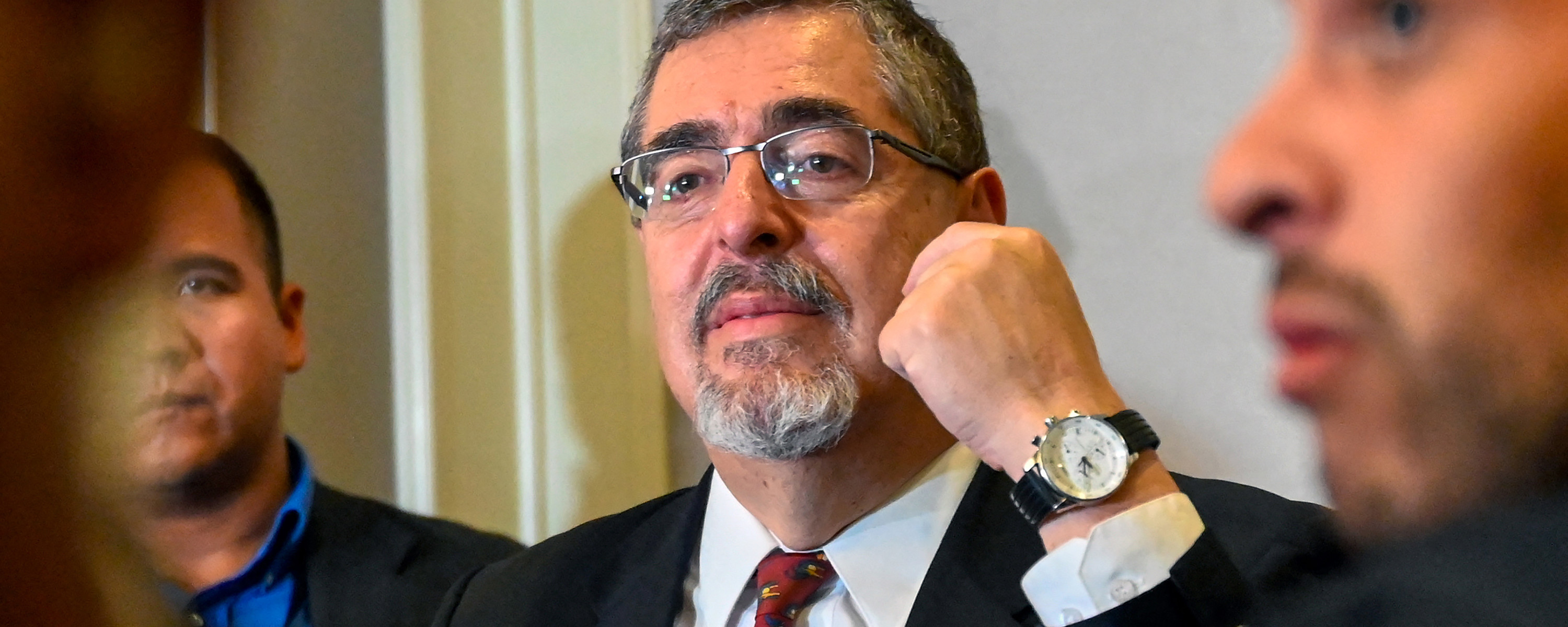El Faro is an investigative newsroom that shines a light on corruption in Central America. Subscribe to our newsletter.
Guatemala, translated from Nahuatl, means roughly “the land of many trees.” Just three hours before Bernardo Arévalo was officially declared president-elect by the Electoral Supreme Tribunal (TSE) on Monday evening, a top official from the same electoral authority approved the suspension of his party. With 137 days left until the January 14 transfer of power, he is clearly far from out of the woods.
The official, Citizen Registrar Ramiro Muñoz, argued that immunity from suspension during election season should not apply because “the second-round election has already been held.” The ruling defied a Supreme Court injunction in favor of Semilla to shield the party through October 31, when —as TSE President Irma Palencia publicly underscored yesterday— election season officially ends.
The Monday order was also a stark reversal of course for the registrar, who refused six weeks ago to carry out the illegal order. Muñoz spent three weeks on leave as threats of prosecution against him arose and even reached his deputy registrar, and as prosecutors and armed police raided the Tribunal.
His eventual approval of the suspension has been expected since early July, and the ensuing legal fight is likely to sprawl out over the next half-year.
Semilla said it will appeal to the TSE magistrates at 7 a.m. on Tuesday and has promised, if necessary, to make its case to the Supreme Court and the Constitutional Court. If local legal avenues are exhausted, they say they will move on to the international arena.
“We are preparing to take administrative, criminal law, and constitutional measures,” Semilla attorney Juan Gerardo Guerrero told El Faro English. “If necessary, we will again resort to the Inter-American Commission, to later take [our case] to the Inter-American Court of Human Rights.”
“In the current scenario, which is outside the framework of the law, they [Guatemalan authorities] can take all sorts of action totally afoul of the Electoral Law of Political Parties in order to prevent us from taking office,” Guerrero added.
In a press conference announcing the vote certification, the TSE magistrates said they were unaware of the registrar’s decision before it was made public and declined to stake out any stance on the matter in order to avoid sullying their ruling on an appeal.
“This [suspension] order is illegal,” constitutional lawyer Édgar Ortiz told El Faro English. “A criminal court judge cannot get involved in electoral affairs because election law is of a special constitutional status.”
“In the worst of cases, assuming that they will suspend Semilla, suspension is an administrative sanction intended for parties to correct some violation of electoral law,” he added. “It usually freezes some of the party’s rights until they resolve the administrative problem, but the party continues to legally exist.”
Security concerns
Arévalo and Vice President-Elect Karin Herrera draw a legal distinction between their victory and the suspension of the party.
“From this moment on, nothing can legally stop us from being sworn in on January 14, just as is constitutionally established,” President-Elect Bernardo Arévalo told the press at 8:30 p.m. in the Hilton Garden Hotel in Guatemala City, surrounded by a stern presidential security detail.
He added: “There is a process of political persecution illegally utilizing justice system institutions against the Semilla Movement and against our candidacy.”
Efforts to suspend Semilla date back to early July, minutes before the first-round vote certification, when the Public Prosecutor’s Office obtained a court order for allegations of signature forgery and money laundering.
The order drew a barrage of local and international condemnations, U.S. sanctions, and promises from President Giammattei that the elections and inauguration would be held amid fears of a successful electoral coup.
According to top prosecutor Rafael Curruchiche just three days before the runoff election, the Public Prosecutor’s Office has not ruled out raids, arrest warrants, and impeachment requests against Semilla.
For now the party will not hold a public celebration of the certification of the results due to security concerns. Last week they suspended the victory rally scheduled for August 22. Two days later, the Inter-American Commission issued precautionary measures on behalf of Arévalo and Herrera, citing reports of two assassination plots that included “state actors.”
As for one plot, the Commission noted that anti-extortion prosecutors had alerted Arévalo on the night of his victory of “criminal gang structures” looking to harm him. But the precautionary measures also reported “threats, monitoring, and incitement to violence” from “persons linked to the Public Prosecutor’s Office.”
The Office has not publicly commented on the plots to kill now president-elect Arévalo. Instead, Attorney General Consuelo Porras asked the Guatemalan government to pressure the Inter-American Commission for precautionary measures of her own on Friday, denouncing as illegal dozens of posts on X/Twitter relating to public calls for her resignation.
The Constitutional Court rejected Porras’ request to censor critical social media accounts, including those of multiple journalists.
The Public Prosecutor’s Office is fighting multiple open fronts, all of them internationally criticized as illegal. The attack on Semilla’s legal standing coincided on Monday with a raid on the house of the parents of exiled former anti-impunity prosecutor Juan Francisco Sandoval and the arrest of Claudia González, Sandoval’s lawyer and also the current defense attorney of political prisoner Virginia Laparra.
U.S. Assistant Secretary of State Brian Nichols condemned these moves as a “blatant weaponization of the justice system.” OAS Secretary General Luis Almagro similarly denounced the raids in the morning and the suspension of Semilla in the evening. As more statements likely trickle in over the next few hours, the question is whether any international pressure can tilt the scales in the case of Semilla like it did in obtaining promises of a fair runoff.
This article first appeared in the August 29 edition of the El Faro English newsletter. Subscribe here to tune into Central America.

